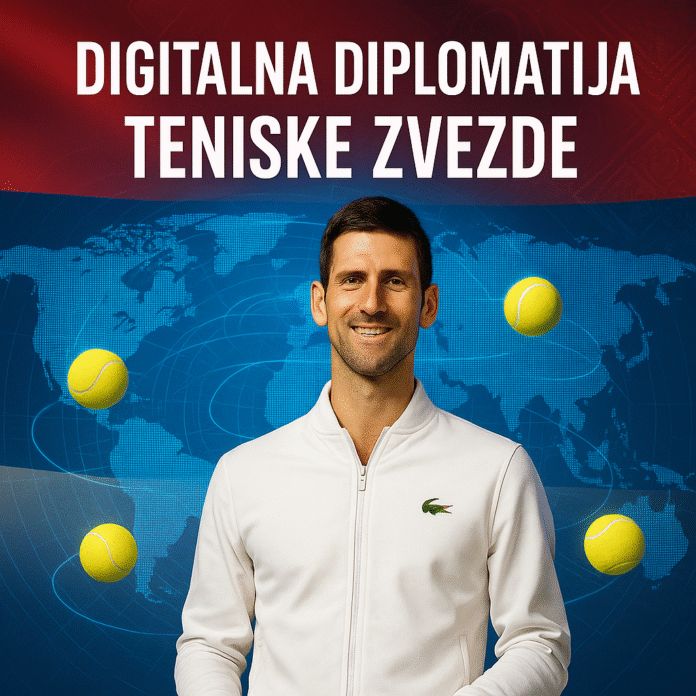In the modern digital space, social media algorithms favor content that evokes emotion, controversy, or admiration. Djokovic, with his personality, playing style, and outspoken stances, fits perfectly into this dynamic.
Sport as a field of soft power
Soft power, as defined by Joseph Nye, is the ability of a country to influence others not through force or money, but through the appeal of its culture, values, and politics. In this sense, sport is one of the most effective means of public diplomacy. Athletes do not carry diplomatic passports, but they often have greater influence than official representatives of the state. In the case of Serbia, the name that stands out the most in this context is Novak Djokovic.
Global recognition: Djokovic as a symbol of Serbia
Novak Djokovic is not only one of the most successful tennis players in history – he is also a global brand. As of July 2025, Djokovic has won:
- 24 Grand Slam singles titles (most in men’s competition),
- 40 Masters 1000 titles,
- More than 410 weeks at world number 1 – a record that continues to grow.
His name is synonymous with consistency, resilience, mental strength, and perfectionism. The number of followers on social media speaks volumes about his digital reach:
- Instagram: over 13 million followers
- Twitter (X): over 9 million followers
- Facebook: more than 10 million followers
On Google Trends searches, Djokovic regularly reaches peaks of interest during Grand Slam tournaments, often surpassing athletes from much larger countries.
According to a survey by YouGov (2023), Djokovic is among the 10 most popular athletes in the world, alongside Lionel Messi, Rafael Nadal, and LeBron James.
Djokovic as Ambassador of Serbia
Unlike many athletes who are symbolically attached to their country, Djokovic constantly and consciously emphasizes his Serbian origin and the origins of his success. His speeches after winning tournaments often include messages of support for Serbia, the Serbian people, or reflect on the challenges he went through growing up during the war and transition years.
When he was denied entry to Australia in 2021 due to his vaccination status, global media followed the case for days under the title “Djokovic Saga”. Regardless of the views on the specific case, what was obvious was that Serbia’s name appeared for days in all global media, from CNN to Al Jazeera, which further strengthened the digital reach of the “Serbia” brand.
Djokovic is also known for his numerous humanitarian initiatives. His foundation invests in the education of children in Serbia, especially in rural areas, further strengthening the country’s reputation for investing in knowledge, education, and the future.
Digital diplomacy and algorithmic advantage
In the modern digital space, social media algorithms favor content that evokes emotion, controversy, or admiration. Djokovic, with his personality, playing style, and outspoken stances, fits perfectly into this dynamic.
When he won Roland Garros in 2023, the video of him walking out with the Serbian flag went viral – on Instagram alone, the video had over 20 million views. In addition, the hashtag #Djokovic was trending on Twitter in over 30 countries on the same day. This kind of digital visibility cannot be bought through classic PR campaigns – it is the result of an authentic narrative and a strong personality.
That is why it is important for Serbia’s digital diplomacy to recognize and institutionalize such moments. The Ministry of Foreign Affairs and diplomatic and consular missions could, through social networks and websites, further expand the narrative about Djokovic as the ambassador of Serbia’s soft power.
Comparative analysis: Djokovic and other sports icons
Compare Djokovic’s influence with, for example, Cristiano Ronaldo’s influence on Portugal. Ronaldo is, according to the Brand Finance Nation Brands report (2022), one of the key reasons for the increase in positive perceptions of Portugal among younger populations in Asia and Latin America. Similarly, Djokovic shapes the image of Serbia in the eyes of millions of people who may have never heard of it before seeing him at Wimbledon or the US Open.
Also, unlike athletes who play for national teams, Djokovic is constantly present at individual tournaments, which allows him to project a narrative about Serbia throughout the year, regardless of the sports calendar.
Conclusion: Strategy for the future
Novak Djokovic represents one of the brightest spots in Serbia’s soft power. His influence goes far beyond the boundaries of sport – he is a media magnet, a digital icon, and a moral compass for many young people around the world. His presence on the global stage must be strategically used as part of Serbia’s broader public diplomacy strategy.
As a suggestion for concrete steps:
- Inclusion of Djokovic’s successes in promotional campaigns about Serbia as part of the “Serbia Creates” strategy.
- Cooperation between the Ministry of Sports and the Ministry of Foreign Affairs in creating the narrative “Serbian World Champion” through digital platforms.
- Creating an institutional “Digital Museum of Success” that would encompass moments such as Grand Slam wins, inspirational speeches, and humanitarian work.
In a time when attention is the most valuable currency, Serbia is privileged to have a personality who brings millions of people together every day around a common emotion – pride, admiration and inspiration. Novak Djokovic is, without a doubt, the strongest digital diplomat Serbia has – and without a formal position.
Key messages for diplomats
- Novak Djokovic is the most recognizable global Serb– uses his reputation to strengthen the image of Serbia in the world.
- His successes and behavior on and off the field represent Serbia as a country of talent, perseverance and humanity.
- Serbia’s digital diplomacy must recognize Djokovic’s moments of gloryas a chance to spread a positive narrative about the country.
- Djokovic’s popularity on the networks(over 30 million followers) makes him the unofficial ambassador of Serbia in the digital sphere.
- When Djokovic wins a tournament, the world listens – Serbia must communicate.Embassies and institutions should react promotionally and strategically.
- Humanitarian work of the Djokovic Foundationis a valuable resource for promoting Serbia as a country that invests in the education and future of children.
- Suggestions for concrete steps:
- Embassies to share his messages and successes with local hashtags (#SerbiaCreates, #NovakDjokovic)
- MVP to organize the “Serbia Creates Champions” campaign
- Creating a digital museum of sports achievements with the support of relevant institutions
- In times of crisis and polarization, sport brings people together.Djokovic’s success is universally understandable – that’s why he’s valuable in diplomacy.
Short biography of Novak Djokovic
Novak Djokovic was born on May 22, 1987 in Belgrade, Serbia. He began playing tennis at the age of four, and made his professional debut in 2003. In 2008, he won his first Grand Slam, the Australian Open. Since then, Djokovic has become one of the most dominant tennis players in the history of the sport.
By 2025, he had won:- 24 Grand Slam titles (the most in the history of men’s tennis),- 40 ATP Masters 1000 titles,- More than 410 weeks at the world number 1 position.
He is known for his physical fitness, mental strength and exceptional technical precision. In addition to his sporting successes, Djokovic is also a philanthropist – he is the founder of the Novak Djokovic Foundation, which promotes early education in Serbia and beyond.
He speaks multiple languages, including Serbian, English, French, and German. He is known for his dedication to family, healthy lifestyle, and outspoken views on social issues.
Djokovic has repeatedly emphasized that it is a great honor for him to represent Serbia, and his successes and behavior on and off the court make him one of the most influential athletes of the 21st century.
zvonkososevic with AI














